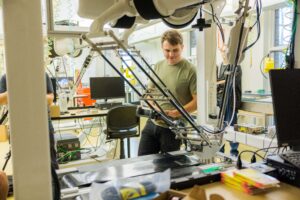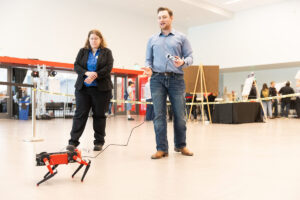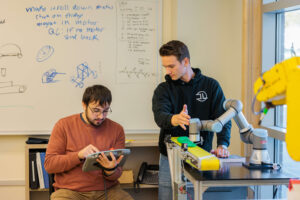Mechanical Engineering Major, Bachelor of Science (BS)
In order to ensure all EWU Mechanical Engineering graduates meet EWU ABET accreditation requirements, all mechanical engineering students are required to take , , , , , and / from EWU. Exceptions to this policy will be reviewed on a case by case basis by the mechanical engineering curriculum review committee to ensure you have successfully met the EWU ABET performance indicators required for each course.
The first two years of the curriculum allow students to establish a solid foundation in mathematics, sciences and introduces foundation subjects in mechanical engineering. The third- and fourth-year curriculum explores further areas in mechanical engineering and a capstone is introduced in the fourth year. The senior year capstone course allows you to consolidate your education experience. The primary objective of the Mechanical Engineering Program is to prepare you to enter and progress in mechanical engineering positions in business, industry and government. Graduates are generally expected to work in the research and development of ideas, products and processes by applying engineering principles to the solution of practical problems in the mechanical engineering field.
Note: pre-program prerequisites include , , , .
Most of the following courses have minimum grade requirements and are prerequisites for engineering courses.
Grades ≥C in all of the following
- , , and
- and
- , , , , , and
- and
Grade Requirements: in order to graduate, students majoring in the department must earn a GPA ≥2.5 in departmental coursework.
& | GENERAL CHEMISTRY I
and GENERAL CHEMISTRY LABORATORY I (equivalent to banked CHEM 151) | 5 |
| CALCULUS I | 5 |
| CALCULUS II | 5 |
| CALCULUS III | 5 |
| CALCULUS IV | 5 |
| INTRODUCTORY DIFFERENTIAL EQUATIONS | 4 |
| GENERAL PHYSICS I | 4 |
| GENERAL PHYSICS II | 4 |
| GENERAL PHYSICS III | 4 |
| MECHANICS LABORATORY | 1 |
| HEAT AND OPTICS LABORATORY | 1 |
| ELECTRONICS LABORATORY I | 1 |
& | INTRODUCTION TO ENGINEERING
and INTRODUCTION TO ENGINEERING LAB | 5 |
& | MATLAB
and MATLAB LAB | 3 |
& | ELECTRICITY
and ELECTRICITY LAB | 4 |
| 3D PARAMETRIC COMPUTER AIDED DESIGN | 4 |
| STATICS | 4 |
| STRENGTH OF MATERIALS | 4 |
& | DYNAMICS
and DYNAMICS LAB | 4 |
& | LABORATORY ANALYSIS AND REPORTS
and LABORATORY ANALYSIS AND REPORTS LAB | 5 |
| INDUSTRIAL CONTROLS AND INSTRUMENTATION | 5 |
& | INDUSTRIAL MATERIALS
and INDUSTRIAL MATERIALS LAB | 5 |
& | THERMODYNAMICS
and THERMODYNAMICS LAB | 5 |
& | FLUID MECHANICS
and FLUID MECHANICS LAB | 5 |
& | ROBOTICS AND AUTOMATION
and ROBOTICS AND AUTOMATION LAB | 5 |
| ENGINEERING NUMERICAL ANALYSIS | 5 |
| DESIGN OF MACHINE ELEMENTS | 5 |
| FUNDAMENTALS OF ENGINEERING | 2 |
& | HEAT TRANSFER
and HEAT TRANSFER LAB | 5 |
| ENGINEERING ECONOMICS | 2 |
| SENIOR SEMINAR | 1 |
| ENGINEERING ETHICS, CONTRACTS AND PATENTS | 2 |
& | METALLIC PROCESSES
and METALLIC PROCESSES LAB | 5 |
| TECHNOLOGY WORLD CIVILIZATION | 4 |
&
| HEATING, VENTILATING AND AIR CONDITIONING
and HEATING, VENTILATING AND AIR CONDITIONING LAB | |
&
| MATERIALS AND DESIGN
and MATERIALS AND DESIGN LAB | |
| COMPOSITE MATERIALS | |
&
| ADVANCED FLUID DYNAMICS
and ADVANCED FLUID DYNAMICS LAB | |
&
| ADVANCED ROBOTICS AND AUTOMATION
and ADVANCED ROBOTICS AND AUTOMATION LAB | |
| PROGRAMMABLE LOGIC CONTROLLERS IN AUTOMATION | |
| MECHATRONICS | |
| FINITE ELEMENT ANALYSIS | |
| ADVANCED PARAMETRIC DESIGN | |
or
& | QUALITY ASSURANCE AND INTRO TO LEAN
and QUALITY ASSURANCE AND INTRO TO LEAN LAB |
or | SENIOR THESIS |
or | INTERNSHIP |
| |
& | SENIOR CAPSTONE: DESIGN LABORATORY I
and SENIOR CAPSTONE: DESIGN LABORATORY I LAB | 2 |
& | SENIOR CAPSTONE: DESIGN LABORATORY II
and SENIOR CAPSTONE: DESIGN LABORATORY II LAB | 3 |
| Total Credits | 154 |
The following plan of study is for a student with zero credits. Individual students may have different factors such as: credit through transfer work, Advanced Placement, Running Start, or any other type of college-level coursework that requires an individual plan.
Courses could be offered in different terms, checking the academic schedule is paramount in keeping an individual plan current. Students should connect with an advisor to ensure they are on track to graduate.
All Undergraduate students are required to meet the Undergraduate Degree Requirements.
| First Year |
|---|
| Fall Quarter | Credits | Winter Quarter | Credits | Spring Quarter | Credits |
|---|
| 5 | | 5 | | 5 |
| 5 |
& (Natural Science BACR 1) | 5 | | 5 |
| 4 | Humanities & Arts BACR 11 | 5 |
& (Natural Science BACR 2) | 5 |
| | 14 | | 15 | | 15 |
| Second Year |
|---|
| Fall Quarter | Credits | Winter Quarter | Credits | Spring Quarter | Credits |
|---|
| 5 |
& | 3 |
& | 5 |
| 4 |
& | 4 | | 4 |
& | 5 | | 4 |
& | 4 |
| | Diversity - graduation requirement1 | 5 | | 5 |
| | 14 | | 16 | | 18 |
| Third Year |
|---|
| Fall Quarter | Credits | Winter Quarter | Credits | Spring Quarter | Credits |
|---|
& | 5 |
& | 5 |
& | 5 |
| 5 |
& | 5 |
& | 5 |
| Humanities & Arts BACR 21 | 5 | Social Science BACR 11 | 5 |
& | 5 |
| | 15 | | 15 | | 15 |
| Fourth Year |
|---|
| Fall Quarter | Credits | Winter Quarter | Credits | Spring Quarter | Credits |
|---|
| 2 | | 2 | | 5 |
| 1 |
& (Senior Capstone - graduation requirement) | 2 |
& | 5 |
| (Global Studies - graduation requirement) | 4 | | 2 |
& (Senior Capstone - graduation requirement) | 3 |
| Mechanical Engineering Elective2 | 5 | Mechanical Engineering Elective2 | 5 | Mechanical Engineering Elective2 | 1 |
| Mechanical Engineering Elective2 | 5 | Social Science BACR 21 | 5 | |
| | 17 | | 16 | | 14 |
| Total Credits 184 |




